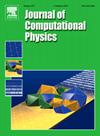气/液-液-固流动的热力学一致且保守的扩散界面模型
IF 3.8
2区 物理与天体物理
Q2 COMPUTER SCIENCE, INTERDISCIPLINARY APPLICATIONS
引用次数: 0
摘要
在这项工作中,提出了气/液-液-固流动的热力学一致和保守扩散界面模型。在该模型中,根据三元相场模型建立了气/液-液-固体系的新自由能,该自由能不仅包含两相流的标准体积自由能和界面自由能,而且还包含反映固相惩罚和固体表面润湿性的附加项。此外,在一致Navier-Stokes方程中还引入了固相的光滑指示函数,以实现固相的高粘度,并通过流固相互作用产生的力保持固体表面的速度边界条件。基于所提出的扩散界面模型,可以简单有效地描述流体界面动力学、流固相互作用和固体表面润湿特性。此外,还证明了两相流在固定几何形状下的总能量是耗散的。为了验证目前的扩散界面模型,我们建立了一个一致和保守的晶格玻尔兹曼方法,并进行了一些模拟。数值结果也证实了所提出的扩散界面模型在研究复杂几何两相流和运动颗粒两相流时具有良好的能量耗散和性能。本文章由计算机程序翻译,如有差异,请以英文原文为准。
A thermodynamically consistent and conservative diffuse-interface model for gas/liquid-liquid-solid flows
In this work, a thermodynamically consistent and conservative diffuse-interface model for gas/liquid-liquid-solid flows is proposed. In this model, a novel free energy for the gas/liquid-liquid-solid system is established according to a ternary phase-field model, and it not only contains the standard bulk and interface free energies for two-phase flows, but also includes some additional terms to reflect the penalty in the solid phase and the wettability on the solid surface. Furthermore, a smooth indicator function of the solid phase is also introduced in the consistent Navier-Stokes equations to achieve a high viscosity in the solid phase, and to preserve the velocity boundary conditions on the solid surface by the force caused by fluid-structure interaction. Based on the proposed diffuse-interface model, the fluid interface dynamics, the fluid-structure interaction, and the wetting property of the solid surface can be described simply and efficiently. Additionally, the total energy is also proved to be dissipative for the two-phase flows in the stationary geometries. To test the present diffuse-interface model, we develop a consistent and conservative lattice Boltzmann method and conduct some simulations. The numerical results also confirm the energy dissipation and good capability of the proposed diffuse-interface model in the study of two-phase flows in complex geometries and two-phase flows with moving particles.
求助全文
通过发布文献求助,成功后即可免费获取论文全文。
去求助
来源期刊

Journal of Computational Physics
物理-计算机:跨学科应用
CiteScore
7.60
自引率
14.60%
发文量
763
审稿时长
5.8 months
期刊介绍:
Journal of Computational Physics thoroughly treats the computational aspects of physical problems, presenting techniques for the numerical solution of mathematical equations arising in all areas of physics. The journal seeks to emphasize methods that cross disciplinary boundaries.
The Journal of Computational Physics also publishes short notes of 4 pages or less (including figures, tables, and references but excluding title pages). Letters to the Editor commenting on articles already published in this Journal will also be considered. Neither notes nor letters should have an abstract.
 求助内容:
求助内容: 应助结果提醒方式:
应助结果提醒方式:


